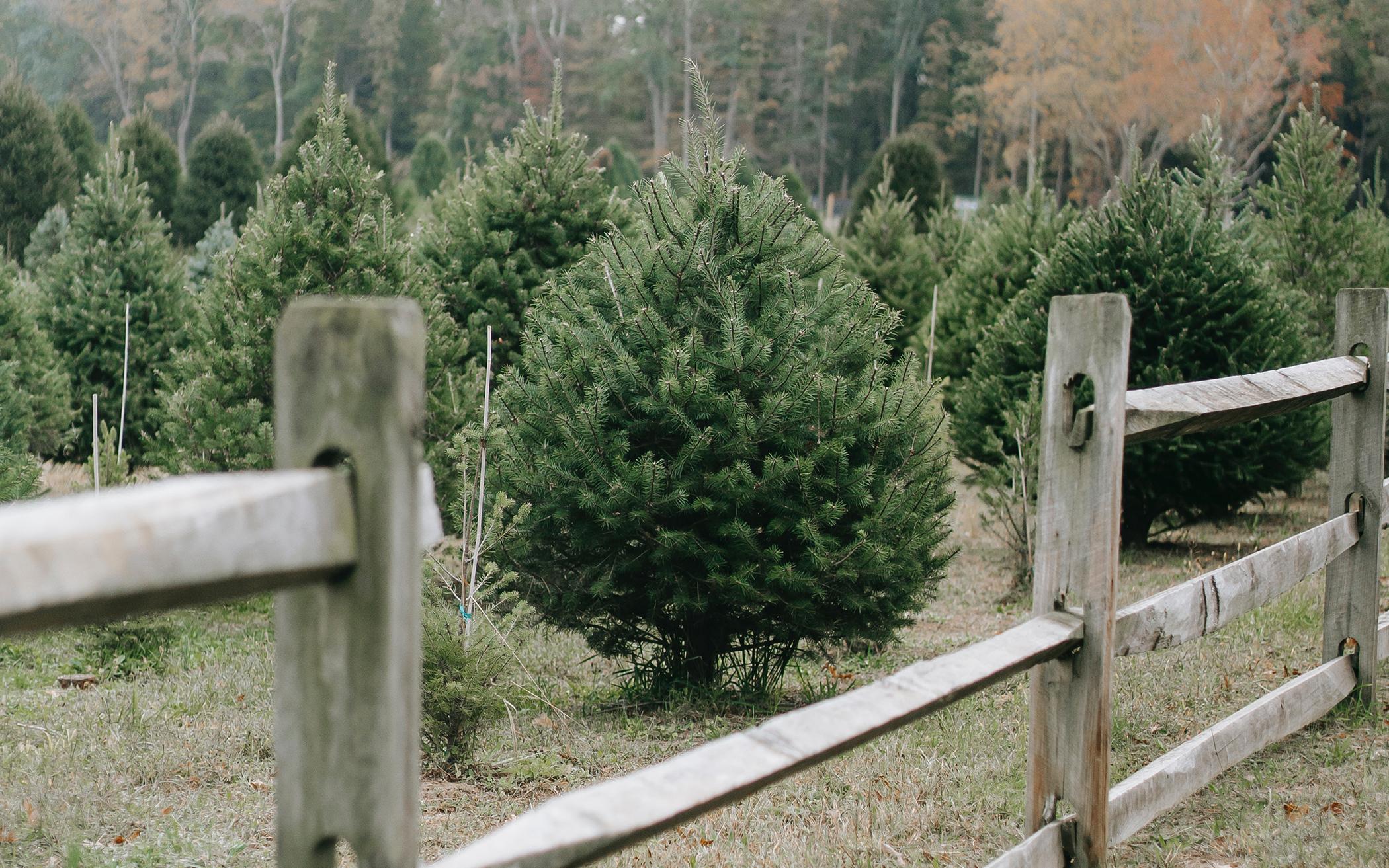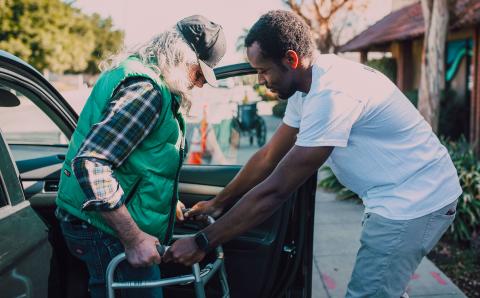As I walked through the few remaining rows of Christmas trees, I attempted to sort out my feelings. When I was growing up, there were hundreds of acres of trees. These few were all that remained. I should feel something, I told myself. While a little part of me wanted to cry, the emotion that bubbled up instead was joy. I was playing peek-a-boo from behind the trees with my toddling grandson. My husband and kids walked the rows with me.
We were searching for the perfect tree, and I looked forward to the beauty and fresh pine smell it would add to my home. Of course, it would also leave sap on our hands and drop needles on the carpet.
The tree farm I grew up on reminds me that joy and sorrow often mingle side by side, especially during the holidays. Year in and year out for 50 years, my family brought the tradition of cutting down and bringing home a live Christmas tree to countless other families. It was exhilarating and exhausting. There were festivities and frustrations. It was stressful, yet satisfying. We loved it. We also looked forward to the end of the season.
About a week before Christmas, the steady stream of customers would slow to a trickle, and we could finally focus on our own family traditions. We wrapped the presents and prepared the food. On Christmas Eve, our family’s traditional night to celebrate, we were ready.
After consuming our array of appetizers, main dishes, and sweets, we tore open our gifts, moving from the youngest child (and later grandchild or great-grandchild) to the oldest. Then we gathered around the piano for the most treasured moment of the night. I don’t remember when the tradition started, but what began as a few simple Christmas hymns grew into a four-part amateur rendition of Handel’s “Hallelujah” chorus.
As the family grew, so did the “choir.” At almost 30 strong, we struggled through—sopranos straining to reach the high notes as altos, tenors, and basses searched for the harmony lines. Despite our imperfection, singing those hallelujahs soon became the main event of the night. Even the non-singers took part by running video cameras and taking photos. The littlest family members stood among us, gazing upward to the voices that drew their attention away from their new toys. No one packed up their gifts or sent the kids to the car until the singing was over.
Just like the tree farm that attracted customers from far and wide, the opening measures of the song pulled us all together in a melodic embrace. Year after year, we could count on Mom’s powerful alto voice, while Dad, beaming with delight (and a little pride), helped carry the bass section.
When Change Comes
In 2018, with my parents in their key roles, we gathered to sing in their home. Mom’s beautiful tree, adorned in white lights, lace, and rose-colored ornaments, blended well with her country blue decor. Glass candy bowls brimming with her sugar-and-spice pecans were reduced to bowls of crumbs by the end of the evening.
By the following year, as Mom’s Alzheimer’s gradually stole her strength and skills, my parents could no longer host all 40-plus members of the family. We gathered a few miles away at my sister’s instead. Although Mom and Dad attended, Mom could only tolerate the noise and crowded house for a couple of hours. They headed home before the singing.
Still, we carried on. Things weren’t quite right without them, but muddling through our hallelujahs helped distract us from the gradual changes our family was experiencing.
Then came 2020, and the changes were no longer gradual. We lost Dad suddenly in July after a brain bleed caused by a fall. Though he had been aging, the abrupt end to the life of this hardworking farmer, our father, was the last thing we expected on that lovely summer day.
Mom’s Alzheimer’s continued to progress. Then, in late October, after tests revealed she had cancer, we arranged for home hospice care. The pandemic was raging and, difficult as it was, my siblings and I decided it was best to cancel our annual holiday party.
The following year, we finally gathered for Christmas again. It had been nearly 18 months since Dad had gone to heaven, and nine months since Mom joined him there. So much had changed. By then my nephew’s young family had moved into my parents’ home and changed the color scheme from Mom’s country blue. The farm was still a meeting place for us all, but there was no teatime around Mom’s table. And with the tree farm closing a few years earlier, only a sparse number of trees grew in the field.
In that first year without Mom and Dad, we came together at my brother’s house. We tried a new gift exchange idea. My sisters and I tweaked the menu for our family feast. The great-grandchildren had grown and changed since we last gathered, and we welcomed two new little ones for the first time.
Many elements of our celebration had changed, but other traditions remained. There were dishes filled with Mom’s sugar-and-spice pecans, and as usual, we critiqued the size and shape of the host’s Christmas tree. We talked and laughed and reminisced.
Then we sang our hallelujahs.
Choking back tears, singing didn’t come easily. But when one of us dropped out, another carried us through. Our family had changed, but the love between us—our siblings, in-laws, nieces, nephews, and “the great-grands”—had only deepened. Mom and Dad would have wanted us—no, expected us—to keep on singing.
Searching for the Stable
Ours is not the only family that grieves losses—of jobs, relationships, opportunities, loved ones—during the holidays. In fact, Christmastime often brings those losses to the fore.
Our yearning for tradition in the midst of loss makes the holidays especially difficult. Celebrating and singing might be the furthest thing from our minds. Yet what a comfort it is to know that, whether we’re crying or singing, “Emmanuel” means God is with us.
The evergreen trees with their glittering lights, no matter how perfectly shaped, will not heal our broken hearts. The hallelujahs, no matter how in tune and in time, cannot bring us lasting joy. Instead, we turn to the One who promises everlasting light and life, the One to whom we raise those hallelujahs.
As we walk through this Advent season, we are searching for more than the perfect tree. Our traditions might fill our earthly need for stability. But what we’re really searching for is in that stable under the star. What we crave is the comfort of the Christ-child.
Despite the sadness we feel in this broken, hurting world, our faith lies in him. For “the kingdom of this world is become the kingdom of our Lord.” He alone has the power to heal our broken hearts and turn our sorrow into joy. His birth promises a future celebration better than any past, present, or future Christmas party.
With the joy his promise brings, we can lift our voices and together sing, “Hallelujah!”
Editor’s note: A version of this article was published on TheBanner.org’s As I Was Saying blog in 2021.
About the Author
Linda Hanstra, author of Empty-Nest Joyride: Hope, Love, and Purpose on the Road to Contentment, attends Church of the Savior in South Bend, Ind., with her husband, Tom. Find more of her writing at lindahanstra.com and on Substack.









